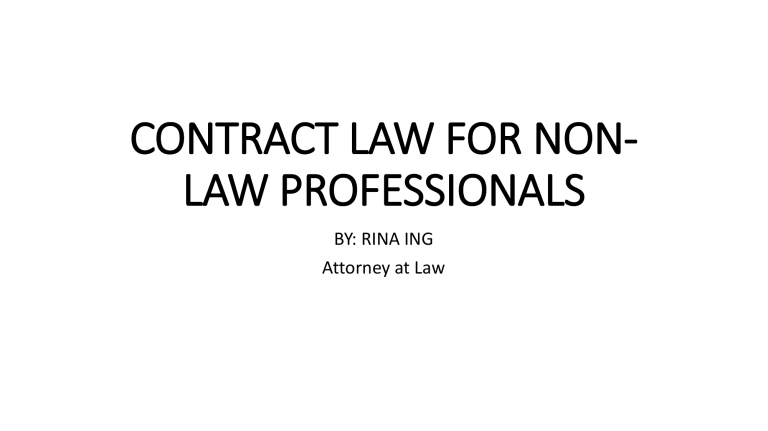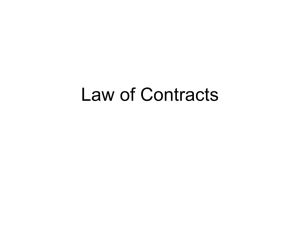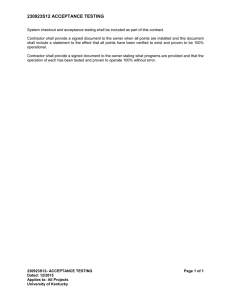
CONTRACT LAW FOR NONLAW PROFESSIONALS BY: RINA ING Attorney at Law Content • • • • • • • • • • • • • Roles and responsibilities of a contract manager Understanding Contractual Materials and Terms Exclusion Clauses Construction of the Contract Vitiating Factors in a Contract Managing Contract Performance Essential Negotiation Skills Enforceability – Is the contract enforceable? Managing Contract Performance Essential Negotiation Skills Enforcement methods Termination of Contracts Remedies for the Breach of Contract Roles and Responsibilities of A Contract Manager Roles and responsibilities of a contract manager • Support to bid / proposal preparation and management, such as review, development or identification of appropriate contracting model and / or terms and conditions; managing stakeholder review / approvals. • Contracts (various: including formal, short form, and annual contracts)—Drafting, Evaluation, Negotiation and Execution: • Non Disclosure Agreements, Sales / Purchasing Agreements, Subcontracts, Consulting Agreements, Licensing Agreements, Master Agreements, review of customer or supplier proposed terms and conditions Roles and responsibilities of a contract manager • Distribution Agreements (resellers, agents, joint marketing etc.) • Commercial and Public (State and Local) Contracting • Serve as the point of contact for customers or suppliers on contractual matters. Act as contractual “middleman” between the organization’s employees and customers, ensuring timely review and approval / reconciliation of variations. Roles and responsibilities of a contract manager • On all standard and nonstandard contracts, provide redlined recommendations and often negotiate directly with lawyers, commercial or purchasing staff until consensus has been reached • Maintain contractual records and documentation such as receipt and control of all contract correspondence, contact information sheets, contractual changes, status reports and other documents for all projects. • As needed, provide guidance on contract matters to project managers or other operational staff, including training to new project managers and other employees in contracting practices and procedures. Roles and responsibilities of a contract manager • Develop and implement procedures for contract management and administration in compliance with company policy. As appropriate, contribute to or influence company policies. • Monitor compliance by company employees with established procedures. Identify areas of recurrent pressure. • Work with Risk Management Department / Finance to coordinate contractual insurance requirements. • Work with Finance to ensure adherence to broader finance and risk requirements such as revenue recognition, pricing and discounting policies,, export controls etc. May include ‘financial engineering’ and understanding / evaluating economic impact of terms and term options. Roles and responsibilities of a contract manager • Support Product Management / Marketing to ensure company products and services are offered with appropriate, competitive terms and conditions • Monitor competitive terms. Monitor customer or supplier satisfaction with our terms and conditions and contracting practices. Recommend changes. • Ensure that signed contracts are communicated to all relevant parties to provide contract visibility and awareness, interpretation to support implementation. Roles and responsibilities of a contract manager • Handle on-going issue and change management • Monitor transaction compliance (milestones, deliverables, invoicing etc.) • Oversee Service Level Agreement Compliance • Ensure contract close-out, extension or renewal. Understanding contractual materials and terms What are the Essential Elements of a Contract? • An Offer • A specific proposal to enter into an agreement as an enforceable contract. • An Acceptance • An offeree’s agreement, verbally or in writing, to the terms of a contract. • Competent Parties • A competent party is “sufficiently mentally able to understand and execute the document.” • Mutual Consideration • A benefit which two parties bargain for and is the primary reason either party enters into a contract. • Legality of Purpose • Courts will not enforce contracts that are for an illegal purpose. • Certainty of Subject Matter • The reason you are entering into the contract must be stated and the terms to which each party is subject to must be clearly defined and specific. If material terms are omitted, there is no contract to enforce. Contracts include, but are not limited to: • • • • • • • • • Agreements • Licenses Cooperative Agreements • Leases Memoranda of Understanding • Permits Interagency Contracts Clinical Agreements Purchase Orders Loans Easements Insurance Policies Other Parties include but are not limited to: •State Agencies •Local Agencies •Non Profit Organizations •Private Businesses •Partnerships •Individuals What standard provisions should contracts include? • Introduction • Identifies the parties and the binding nature of the contract • Contractor should be indentified by it’s full legal name, type of entity (if applicable) and the state in which it is located. • Scope of Work • The true subject matter of the contract • Each duty and obligation of each party should be clearly described, including any necessary details regarding how the duties and obligations will be performed. • Term of the Contract • A definite period of time that the contract will remain in effect • Needs to be a set day, date or condition for the contract to start and a day, date or condition for the contract to end. • If the effective date of the contract is different from the date of execution, then the execution date should be clearly stated. What standard provisions should contracts include? • Payment • Describes the method of payment and contract payment type • Should Include the process of payment to the contractor, the format of invoices, the timing of invoices and payment schedule. • Force Majeure • Excuses a party from liability if some unforeseen event beyond the control of the party prevents it from performing its obligations under the contract • Usually includes acts of god, riots, strikes, natural disasters, terrorism, war, epidemics, etc. • Independent Contractor Status • In the case of an independent contractor, the state agrees that the contractor is not an employee of the state, and the state is not liable for negligence as a result of the work the contractor performed, or for any subcontractor-related disputes. • Assignability • In general, neither party shall be able to assign its duties and obligations without the permission of the other party. What standard provisions should contracts include? • Venue • Governs where a case will be tried should a lawsuit arise • Severability • If any term or provision of an agreement is found to be invalid, the invalidity of that section should not effect the validity of any other section of the agreement, provided that the invalid provision is not material to the overall purpose of the agreement. • Default • If the contractor does not abide by the terms of the contract, the inclusion of an abandonment or default clause provides a way for the state to cancel the contract at the time of non-performance. • Events of Default should be clearly stated. • The name, address, e-mail, telephone number and fax number of each party to be notified, should a default or breach occur, should be included. What standard provisions should contracts include? • Termination • Provides a remedy in the case of default or breach of a contract’s terms. • Dispute Resolution What provisions should not be included in contracts? • Attorney Fees & Line of Credit Terms • General Liability Insurance • Confidential Information What provisions should not be included in contracts? • Indemnification of any party • Arbitration • Workers Compensation • Warranties What do I do if my contract contains provisions that shouldn’t be included in contracts? • Send the contract through the contract routing process. The Contract Administration Office will contact the vendor to negotiate contract terms. Please understand that the contract will take longer to process. Stages of a Contract • The following elements of contract management must be considered: Exclusion Clauses Exclusion clauses • The purpose: to exclude all liability for failing to carry out the contract, either at all or not properly; open to abuse • In order to prevent parties relying on unfair contract terms, there are strict legal rules about the use of exclusion clauses • The law protects consumers in particular against the wrongful use of exclusion clauses by businesses Construction of the Contract Contract formation • Offer • Acceptance • Consideration Offer • An indication of willingness to do or refrain from doing sth that is capable of being converted into a legally binding contract • It is made by an offeror to an offeree and is capable of acceptance only by an offeree who knows of its existence Offer • An offer is terminated when it has been revoked, or lapsed, or met with a counter-offer Acceptance • Agreement to the terms of an offer that, provided other requirements are fulfilled, converts the offer into a legally binding contract Acceptance • If the method by which acceptance is to be signified is indicated by the offeror, that method alone will be effective • If it is not, acceptance may be either express (by word of mouth or in writing) or inferred by the offeree’s conduct, e.g. if he receives goods and makes use of them Acceptance • Must involve some action on the part of the offeree Validity of acceptance • 1) it must take place while the offer is still in force; • 2) it must be on the same terms as the offer • 3) it must be unconditional • 4) it must be communicated to the offeror Counter-offer • Acceptance: Only when all the terms of the offer are agreed to • If you propose a change to the terms of an original offer, you are making a new offer – this is called a counter-offer • Counter-offer – a rejection of the original offer; there can be no contract until the counter-offer is accepted Special cases • When the offer consists of a promise to confer a benefit on whoever may perform a specified act, the offeror waives the requirement of communication Example • If the offeror offers a reward for information, a person able to supply the information is not expected to accept the offer formally • The act of giving the information constitutes the acceptance, the communication of the acceptance, and the performance of the contract Intention to create legal relations • If it can be shown that it was not the intenion of the parties to create a legally binding relationship, there is no contract • Presumption: if the agreement is with family or friends, the agreement was not intended to be binding; commercial agreements – the other way round Consideration • An exchange of promises to perform acts in the future • An act, forbearance, or promise by one party that constitutes the price Principles • 1) a valuable consideration is required, i.e. the act, forbearance, or promise must have some economic value • 2) consideration need not be adequate but it must be sufficient (it need not constitute a realistic price as long as it has some economic value) Principles • 3) consideration must move from the promisee • 4) consideration must not be past Legal capacity • Adults have capacity, but not if they are of unsound mind Breaking off contractual negotiations • In legal systems where the doctrine of good faith is recognised, breaking off contractual negotiations may give rise to legal consequences • No duty to negotiate in good faith in English law; no liability for pulling out of negotiations at any stage or for whatever reason Privity of contract • You get the rights or have to fulfill the obligations of a contract only if you are a party to the contract • If you are not a party, you can neither sue nor be sued because of the contract Exception: third party • Example: you have entered into a contract with an insurance company; the aim – that your partner can benefit from the contract; it would be pointless if the company later refused to pay anything to your partner because she was not a party to the contract • English law allowes a third party who is to benefit from the contract to enforce it Contents of the contract • Express terms • Implied terms • Conditions • Warranties • Exclusion terms Terms • Conditions or duties which have to be carried out as part of a contract, arrangemens which have to be made before a contract is valid Express terms • Terms that the parties have specifically agreed to, being terms the parties either said or wrote Implied terms • Example: you buy a boat. The first day you go sailing the boat sinks. You complain to the seller, he says the contract did not promise that the boat would float • One of the terms implied into a contract of sale –that goods are of satisfactory quality and are fit for their purpose Terms of a contract • Term: a promise that is part of the contract • Terms of a contract: • 1) conditions • 2) warranties Condition • A fundamental term • If a party does not carry it out, you not only have the right to claim damages, but also to treat the contract as terminated Warranty • A term of contract of lesser importance • Does not deal with the main purpose of the contract • If you have not carried out your obligations under a warranty, the other party has the right to sue you for damages, but not to terminate the contract Vitiating Factors in the Contract Reasons to have a contract set aside: vitiating factors • Misrepresentaion • Duress and undue influence • Mistake Misrepresentation • A representation – a statement that was made to encourage you to enter into a contract, but it does not itself become part of the contract • Misrepresentation (false representation) – you cannot bring an action for breach of contract, but you can bring special acton for a misrepresentation if you would not have otherwise entered into the contract Remedies for misrepresentation • Misrepresentation makes the contract voidable • Recission: if you rescind the contract, the parties are put back in the position they were in before the contract was entered into. It is as if the contract never existed • Damages: you can sue for financial compensation if you have suffered any losses Duress and undue influence • Duress: either actual violence or the threat of violence was used to make the other party enter into the contract (“sign this contract or I’ll shoot you!”) • Undue influence: improper pressure other than violence (e.g. blackmail) Mistake • If absolutely fundamental, as it gets to the very heart of the transaction, the contract will be considered void from the outset




